Sem categoria
-
30/09/202511h51Notícia
-
29/09/202509h40Notícia
Guides and Information
Travel Guide for Foreigners
The REINTER Travel Guide for Foreigners is a step-by-step guide to reaching FURG’s campuses, with directions about flights, bus stations, local transportation, and support contacts. If you are coming to study or teach at FURG and are unsure how to get to each campus, this guide is for you. Click the link and access it!Documentation Guide for Foreigners
The REINTER Documentation Guide for Foreigners gathers all the information about the mandatory documents required to study, research, or teach at FURG. It includes instructions on the student visa, CPF, CRNM, visiting professor contract, and the check-in form. If you want to organize your stay in Brazil smoothly and legally, this guide is for you. Click the link and check it out!Guides from PROPESP for Foreigners
The Pro-Rectory of Research and Postgraduation also provides guides for foreign students through this website. -
11/08/202510h59Notícia
-
11/08/202510h47Notícia
Registrations
DATE: December 2, 3, and 4, 2025
VENUE: Integrated Center for Southern Coastal and Oceanic Development – CIDEC Sul, Carreiros Campus, FURG, Rio Grande, RS, Brazil
REGISTRATION: sinsc.furg.brCENTRAL THEME: HUMAN RIGHTS AND CLIMATE EMERGENCIES
Scientific Committee
Prof. Dr. Amanda Netto Brum (PPGD FURG)
Prof. Dr. César Augusto Soares Costa (PPGD FURG)
Prof. Dr. Dione Iara Silveira Kitzmann (PPGEA FURG)
Prof. Dr. Eduardo Pitrez de Aguiar Corrêa (PPGD FURG)
Prof. Dr. Elisa Girotti Celmer (FADIR FURG)
Prof. Dr. Fabiane Simioni (PPGD FURG)
Prof. Dr. Felipe Franz Wienke (PPGD FURG)
Prof. Dr. José Ricardo Caetano Costa (PPGD FURG)
Prof. Dr. Lucia de Fatima Socoowski de Anello (PPGEA FURG)
Dr. Luciana Alves Dombkowitsch (GDiS FURG)
Prof. Dr. Narjara Mendes Garcia (PPGEA FURG)
Prof. Dr. Raquel Fabiana Lopes Sparemberger (PPGD FURG)
Prof. Dr. Renato Duro Dias (PPGD FURG)
Prof. Dr. Sheila Stolz da Silveira (PPGD FURG)
Prof. Dr. Simone Grohs Freire (PPGEA FURG)
Prof. Dr. Vanessa Hernandez Caporlingua (PPGEA FURG)Participation Format
The Forum invites participation in different in-person modalities: a) attendee and b) paper presentation. Those interested in presenting their research must submit an extended abstract, indicating the WG in which they wish to participate. Abstracts must be written as a single paragraph and contain a minimum of 300 and a maximum of 500 words. The abstract must include objective, methodology, results, and conclusions. It must also include 4 keywords in alphabetical order. The title, names of the proponents, their institutions, country, and email must be specified.
Languages: Portuguese and Spanish
Submission of extended abstracts: from August 18 to October 19, 2025.
Notification of abstract acceptance: end of October 2025.
Registration for the general public (attendees): starting August 18, 2025.
Registration address: sinsc.furg.brSimultaneous Working Groups (WGs)
WG1 Environmental Education and Climate Emergencies
Coordinators: Marta Acosta (UNE, Paraguay), Ricardo Barboza Lima (UFG, Brazil), and Matías Penhos (UNQ, Argentina)
This theme aims to analyze and discuss environmental education in the current context, in order to foster a dialogue of knowledge that makes it possible to address various environmental conflicts as political and pedagogical challenges. It proposes to understand comprehensive environmental education as a perspective, that is, as a way of being and being in the world, in order to denaturalize and problematize the ways in which society has been organized and understood in relation to nature and, therefore, its teaching. The interdependence between environmental protection, sustainable development, and human rights has been highlighted by the Inter-American Court of Human Rights (OC-23/2017) and the Inter-American Commission on Human Rights (2019 Report on Business and Human Rights). Consequently, these are issues that are inseparable from human rights education.
We expect to receive papers that: raise awareness of the impact of climate emergencies on education; present good practices in formal and non-formal education contexts; identify the specific challenges faced by teachers in this area; develop preventive and interdisciplinary proposals to address content across different curricula; highlight the design and implementation of public policies on these topics; and debate the role of the private sector or other actors in this field.WG2 Environmental Justice, Social Inequalities, and Environmental Racism
Coordinators: María del Carmen Cortizos (UFSC, Brazil) and Maria José Bournissent (UNL, Argentina)
The current climate emergency requires urgent and immediate measures to address the growing impacts on various dimensions of life, including the worsening of respiratory diseases, the rise of vector-borne illnesses, and the compromise of food production and water availability, with dire consequences for food security. In this context, WG2: Environmental Justice, Social Inequalities, and Environmental Racism proposes to bring together papers that discuss these three axes in an articulated manner: Environmental justice and the distribution of goods and services that ensure the same level of protection against environmental risks for everyone, encompassing social, economic, and political dimensions. The disproportionately greater impact of the negative consequences of the climate emergency on subalternized groups, which constitutes a factor in increasing social inequalities. Racism as a factor that intensifies the negative effects of environmental degradation on marginalized populations and ethnic minorities that suffer from a lack of basic sanitation, exposure to pollution, lack of access to drinking water, proximity to landfills, expulsion from ancestral lands, and lack of access to natural resources, while having little or no participation in decisions that affect their territories.
WG3 Human Rights, Climate Emergencies, and Gender
Coordinators: Melina Fachin (UFPR, Brazil) and Inés Robles Carrasco (UV, Chile)
The climate crisis is one of the main threats to human rights in the 21st century, with disproportionate impacts on women and historically vulnerable populations. This Working Group proposes to reflect on the intersections between climate justice, human rights, and gender equality, highlighting how the effects of the environmental emergency intensify preexisting inequalities, especially in the Global South. From an intersectional and decolonial perspective, the obligations of states and companies to protect rights in the face of the ecological crisis will be addressed, with special attention to the rights to care, land, water, and political participation. Extractivist development models that undermine the sustainability of life and directly affect women’s bodies and territories will be questioned. The Working Group will also analyze experiences of women’s resistance and leadership in the defense of the environment, highlighting their fundamental role in a just ecological transition. It affirms that there is no climate justice without gender justice and that it is urgent to place human dignity and sustainability at the center of political and legal agendas regarding climate change.
WG4 University Outreach in Times of Climate Emergencies
Coordinators: Jane Schumacher (UFSM, Brazil) and Gabriela Arantes Wagner (UNIFESP, Brazil)
University Outreach plays a strategic role in addressing climate emergencies, promoting social justice, inclusion, and sustainability. In the face of worsening environmental crises, it acts as a bridge between academic knowledge and popular knowledge, meeting the real needs of territories. The Working Group (WG) on University Outreach in Times of Climate Emergencies aims to gather and strengthen actions focused on disseminating information about climate impacts, sustainable technologies, and local solutions, with special attention to vulnerable populations.
The WG operates along six main axes: (1) dissemination of accessible and up-to-date information on climate change and adaptation strategies; (2) promotion of social technologies for family farming, water management, renewable energies, and resilient housing; (3) community training for risk management and strengthening autonomy; (4) valuing traditional knowledge through dialogue between science, culture, and local practices; (5) social mobilization and encouragement of community participation in building solutions; and (6) interinstitutional articulation among the university, public authorities, civil society, and the productive sector to promote public policies and collaborative projects. In this way, outreach contributes to strengthening climate resilience and environmental justice in the most affected territories.WG5 Human Rights, Emergencies of the Rights of Nature, and Public Policies
Coordinators: Ela Wiecko (UB, Brazil), Flor de Ma. Meza (Udelar, Uruguay), and Maria Guiomar Frota (UFMG, Brazil)
The proposal is to discuss the right to sustainable development recognized by the UN, which led to multilateral agreements and targets to reduce greenhouse gas emissions and limit global warming to less than 2°C above pre-industrial levels, as recommended by the Intergovernmental Panel of Experts on Climate Change. The targets have not been met, and climate catastrophes haunt us. Yet large multinational mining, chemical, oil, and agribusiness corporations continue to pursue profits, to the detriment of non-human beings and abiotic elements that make up Nature, of which human beings are also a part. They maintain the logic of the overexploitation of Nature, guided by an anthropocentrism legally framed in “human dignity.” However, human superiority finds no basis in the history of Planet Earth or in the sciences. There are other ways of thinking about the world, such as “Buen Vivir” or the “Chthulucene.” In some countries, Nature is already recognized as a subject of rights, and now the IACtHR, reinforcing OC-23/17 on the relationship between environmental protection and human rights, recognizes that environmental degradation affects the effective enjoyment of those rights. To avoid the extinction of human life, it is necessary to overcome the distinction between Human Rights and the Rights of Nature, establish national and international law on another philosophical basis, and formulate public policies that are alternatives to development, and not merely alternative developments.
-
18/07/202510h17Notícia
Organizing Committee
-
E-mail: vforumdh@furg.br
-
-
18/07/202510h16Notícia
-
18/07/202510h15Notícia
City Guide
The City of Rio Grande/RS
 Rio Grande is located in the extreme south of the state of Rio Grande do Sul, Brazil, between Mirim Lagoon, the Patos Lagoon (the largest lagoon in Brazil), and the Atlantic Ocean, recognized by the Federal Chamber as the National Capital of Waters. The municipality occupies a coastal peninsula with an average elevation of just 5 meters, not exceeding 11 meters above sea level in its urban area.
Rio Grande is located in the extreme south of the state of Rio Grande do Sul, Brazil, between Mirim Lagoon, the Patos Lagoon (the largest lagoon in Brazil), and the Atlantic Ocean, recognized by the Federal Chamber as the National Capital of Waters. The municipality occupies a coastal peninsula with an average elevation of just 5 meters, not exceeding 11 meters above sea level in its urban area.
Airports
Salgado Filho International Airport – Porto Alegre/RS (315 km) (POA/SBPA)
Salgado Filho International Airport, located in Porto Alegre, is the main airport in Rio Grande do Sul and is approximately 315 km from Rio Grande, about a 4h30m journey by land. Although there are no direct flights between the two, it is the main option for those seeking national and international connections.
Pelotas International Airport – João Simões Lopes Neto (65 km) (PET/SBPK)
Pelotas International Airport (João Simões Lopes Neto) is located about 65 km from Rio Grande, which is approximately a 1 to 1 hour 15 minute drive, and is the main regional air alternative for those who live in or are visiting Rio Grande.
FURG
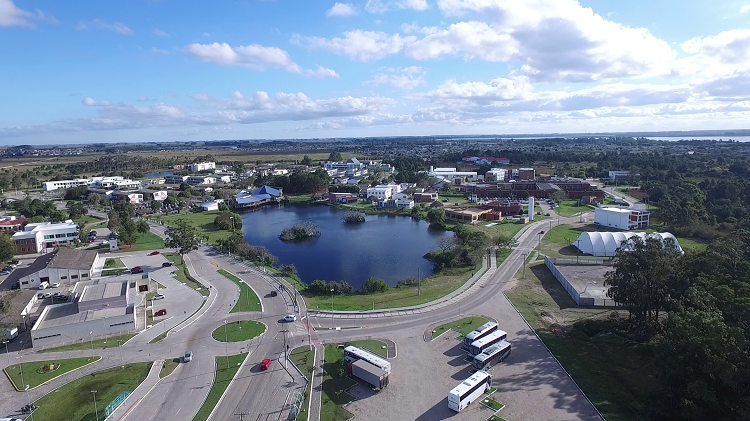
The Federal University of Rio Grande (FURG) was officially established on August 20, 1969, from the merger of four higher education institutions in the city of Rio Grande, Rio Grande do Sul. Its history begins in 1955, with the founding of the School of Industrial Engineering, the first higher education initiative in the region, followed by the creation of other schools, such as Political and Economic Sciences, Law, and Medicine throughout the 1950s and 1960s. FURG stands out nationally for pioneering programs such as Oceanology, the first undergraduate degree in this field in Brazil, created in 1970. Over time, the university expanded its infrastructure, including the Carreiros campus, and consolidated its institutional vocation for the study of coastal and oceanic ecosystems, reflecting a strong integration with the region and local environment. Currently, FURG has around 500 faculty members and offers various undergraduate, master’s, and doctoral programs across multiple fields of knowledge, in addition to a multicampus presence in neighboring cities, serving as an important social and scientific agent in the far south of the state.
CIDEC
CIDEC-Sul (Integrated Center for Southern Coastal and Oceanic Development) is a multipurpose venue linked to the Federal University of Rio Grande (FURG), located at the Carreiros Campus in Rio Grande/RS. Inaugurated in 2008, CIDEC-Sul was created to meet the need for a dedicated space to hold major institutional events for the university and the region. The venue is frequently used for lectures, seminars, academic and cultural events, graduation ceremonies, public ceremonies, and community debates, and is recognized for its size and versatile structure—it accommodates up to 1,100 people and can be divided into smaller auditoriums as needed.
Km 8 Avenida Itália, Carreiros, Rio Grande - RS, 96203-900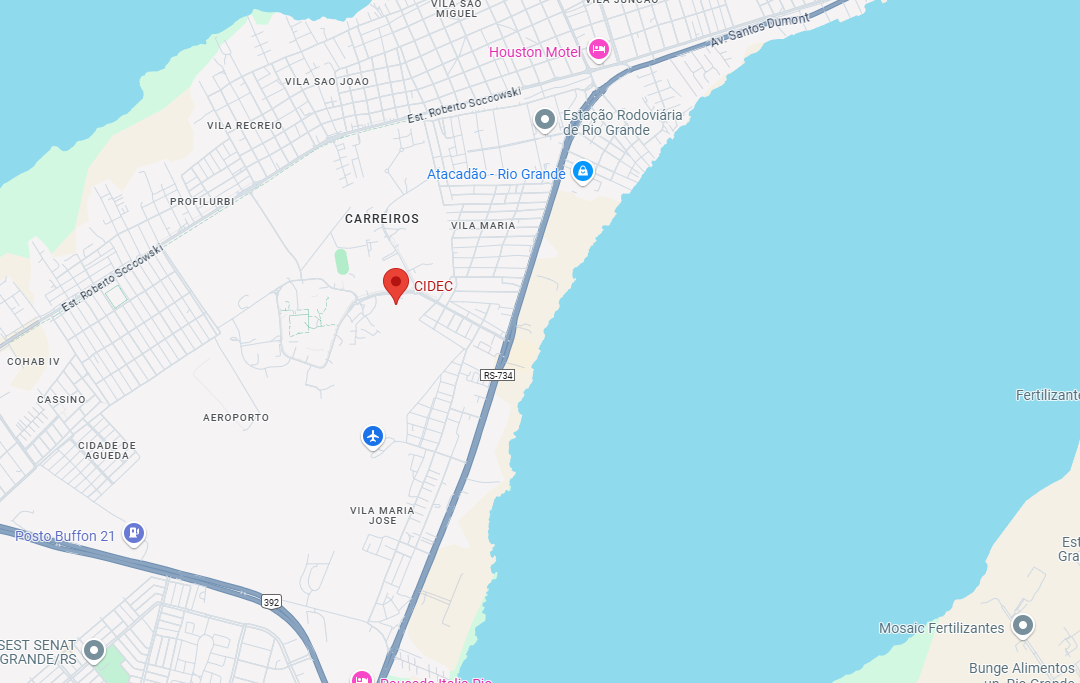
Partner Hotels
To facilitate reservations, we offer the promotional code AUGM2025, which grants a 15% discount on the current daily rate, valid for stays between November 30 and December 6, 2025.
Hotel Atlântico – Cassino
(15 km from FURG)
Official website: www.hoteisatlantico.com.br
WhatsApp: +55 (53) 99992-7294Hotel Atlântico – Centro (Rio Grande)
(10.5 km from FURG)
Official website: www.hoteisatlantico.com.br
WhatsApp: +55 (53) 99992-7294Swan Hotels Network – Centro (Rio Grande)
(10.5 km from FURG)
Website: swanhoteis.com.br/swan-rio-grande
WhatsApp: +55 (51) 9 9228-2343 -
18/07/202510h14Notícia
Schedule
5th International Human Rights Forum
Central Theme: Human Rights and Climate Emergencies
-
Date: December 2, 3, and 4, 2025
-
Venues:
-
Venue 1: CIDEC Sul – Integrated Center for Southern Coastal and Oceanic Development, Carreiros Campus, FURG – Rio Grande/RS
-
Venue 2: Rector’s Office Meeting Room, Carreiros Campus, FURG – Meetings of the Human Rights Chair
-
December 2 (Tuesday)
Venue: CIDEC Sul – Carreiros Campus
-
Photo Exhibition: Human Rights and Climate
-
Open throughout the event (12/02 to 12/04) -
6:00 PM | Reception, welcome, and registration
-
7:00 PM | Cultural opening activity
-
7:30 PM | Official Opening Session
-
8:00 PM | Inaugural Lecture
Special Guests:
-
Her Excellency Marina Silva (to be confirmed)
Minister of the Environment and Climate Change – Brazil
December 3 (Wednesday)
Activities at different venues
Morning | Venues: CIDEC and Rector’s Office
-
9:00–10:30 AM | Panel 1
Human Rights and Climate Emergencies in Latin America -
10:30 AM–12:00 PM | Meeting of the Human Rights Chair
(Venue: Rector’s Office Meeting Room)
Afternoon | Venue: CIDEC
-
12:00–1:30 PM | Lunch break
-
2:00–5:00 PM | Concurrent Working Groups (WGs)*
Evening | Venue: CIDEC
-
7:00–8:30 PM | Panel 2
Human Rights, Climate Emergencies, Structural Inequalities, and Environmental Justice -
After 8:30 PM | Optional group dinner
December 4 (Thursday)
Venues: CIDEC and Rector’s Office – Carreiros Campus
Morning
-
9:00–10:30 AM | Panel 3
Human Rights, Climate Emergencies, and the Role of Public Universities -
10:30 AM–12:00 PM | Meeting of the Chair and presentation of Ciex – FURG’s Interinstitutional Center for Observation and Forecasting of Extreme Events
(Venue: Rector’s Office Meeting Room)
Afternoon
-
12:00–1:30 PM | Lunch break
-
2:00–5:00 PM | Concurrent WGs
(Venue: Carreiros Campus, FURG)
Closing
-
6:00 PM | Closing Panel
Summary presentations from the Working Groups (WGs)
(Venue: CIDEC)
-
Concurrent WGs: Rooms and thematic tracks will be announced in advance to registered participants and coordinators.
-
-
18/07/202510h12Notícia
Presentation
Welcome to the 5th International Human Rights Forum of the Human Rights Chair of the Association of Universities of the Montevideo Group (AUGM).
This year, the 5th Forum will focus on “Human Rights and Climate Emergencies” and will be held from December 2 to 4, 2025, at the Federal University of Rio Grande – FURG.
We look forward to seeing you!Prof. Dr. Renato Duro Dias
General Coordinator of the 5th Forum
Rationale for the theme and the choice of FURG
The role of human rights in implementing international commitments on environmental law and climate change increases the effectiveness of national responses to climate change, taking into account traditional and local knowledge. Likewise, this recognition must be supported by capacity-building measures as well as education and awareness-raising on climate change among all social actors, especially in island and coastal states. (Resolution 07/2021, Climate emergency – scope and inter-American obligations in the field of Human Rights, OAS), the Pact for the Future (UN Resolution A/RES/79/1, 2024) and the 2030 SDGs.
To define preventive policies that are relevant to territorial development, it is necessary to assess its current and evolving situation. Therefore, to anticipate and/or correct imbalances among the different components that interact within the territory, it is necessary to carry out a historical and situational analysis that allows for an integrated and dynamic assessment of the relationships between the physical environment and society (UNDP, 2010). These records involve a special chapter within the universities that make up the regional collective, given that in recent years they have experienced different climate emergencies. By way of a brief and by no means exhaustive review, we recall the floods that directly impacted AUGM member institutions: the National University of the Littoral (2003); the National University of La Plata (2013); FURG (Federal University of Rio Grande) in 2024; and, most recently, the National University of the South (Bahía Blanca) at the beginning of this year.
It is important to highlight that we are still living under the effects of a natural catastrophe that occurred during the months of April and May 2024 in the state of Rio Grande do Sul, when floods of devastating proportions struck the state, a pressing matter within the scope of Human Rights as a legal phenomenon. FURG played a fundamental role in this context.
According to Bulletin 01/2024 of the Extreme Events Committee of the Federal University of Rio Grande – FURG, there are two elements that hinder forecasts: (i) extreme events, unprecedented for an entire generation, lack known environmental parameters for reference; (ii) public agencies do not have observational systems that are sufficiently complex and diverse to allow more advanced models to make this type of prediction. (FURG, Extreme Events Committee, Bulletin 01/2024).
Phenomena of this kind have been increasingly frequent and bring with them a significant threat to a wide range of rights, including the rights to life, food, housing, land, and health—in other words, the right to a healthy and sustainable environment. It is worth stressing that in emerging countries, such as Brazil, the measures taken by both the federal government and subnational entities (states and municipalities) are often palliative or merely temporary, given how incipient are the actions that truly involve other actors from organized civil society.
It should be emphasized that there is an urgent need for public policies that address the demands of populations most vulnerable to extreme climate events. Today we have benchmarks for the application of international commitments on environmental law and climate change, seeking national responses that take into account traditional and local knowledge, such as Resolution 07/2021, which addresses the climate emergency and the scope of inter-American obligations in the field of Human Rights of the Organization of American States; the Pact for the Future, UN Resolution A/RES/79/1 (2024); and the Sustainable Development Goals (SDGs) of the 2030 Agenda. These principles are understood as foundational in terms of respect for the human rights of every person affected by extreme climate events.Working methodology for organizing the 5th Forum
Working Group: Renato Duro Dias (General Coord.), Elisa Girotti Celmer (FADIR), Sheila Stolz (PPGDJS), Vanessa Hernandez Caporlingua (PPGEA), Ana Furlong Antochevis (SECAID), Simone Grohs Freire (PROGRAD/Rector’s Office), Diego de Lemos Avila (Reinter), Nicole Feijó (Reinter), Daiane Dias (PROPESP), Dione Iara Silveira Kitzmann (AUGM Academic Committee on Environment)
AUGM representatives (UDELAR, Uruguay; University of Valparaíso, Chile; UNL, Argentina; UNB, Brazil; and UNE, Paraguay)
General Coordinator: Prof. Dr. Renato Duro Dias – PPGDJS, PPGEA, CRDH FURG and FURG’s institutional representative on the AUGM Human Rights Chair
5th FORUM – EXTENSION PROJECT EXT – 2826Background
The Human Rights Chair of the Association of Universities of the Montevideo Group successfully fulfilled its strategic plan for the first three years of its brief existence (2020–2023) and is now developing the plan for the 2024–2026 period. Among the multiple actions it has been promoting, undoubtedly one of the priority objectives should be the consolidation of one of its most prominent activities: the International Human Rights Forums. This initiative makes it possible to present the identity and ethos of a group of researchers who embrace integration as a tool to promote a culture of human rights.
Brief history of the forums
The 1st International Human Rights Forum, on December 7, 2021, was held in a virtual format, as it was shaped by the context of the COVID-19 pandemic. The coordination of the event was delegated to Professor Claudio Nash (University of Chile). The Chair succeeded in convening expert panels on the theme “Human rights, democracy and a culture of peace: new challenges for protection systems,” with authorities and members of the Chair and international guests. The debate addressed the main challenges posed by the global pandemic context in the field of human rights, with an emphasis on Latin America and the Caribbean.
In 2022, the 2nd annual Forum, “Human rights and democracies,” was held on December 6 and 7 at the University of Chile (UC), with characteristics very different from the previous one. Professor Claudio Nash and the university team hosted the Chair’s first in-person meetings after the pandemic (including those responsible for AUGM’s Executive Secretariat). The meeting focused attention on two keynote lectures delivered by the former President of Uruguay, José Mujica: the inaugural address, “Human Rights and contemporary democracies,” and the second day’s “Dialogue of student organizations.” In parallel, the event hosted the First Regional Meeting on Human Rights of the CUECH Network (Consortium of Chilean State Universities).
The 3rd Human Rights Forum took place at the Federal University of Goiás (Goiânia, Brazil), from December 4 to 6, 2023, with the thematic axis: “Human rights, development, and Latin American integration.” The Chair’s representative at UFG, Ricardo Barboza, was responsible for the organization together with a team of faculty and students who simultaneously organized the “XIV Thinking Human Rights” Congress. Within this framework, the Chair held its second in-person meetings, with ten representatives present and members of AUGM’s Executive Secretariat. The event featured two lectures (Opening and Closing), four roundtables with participants from the Chair and UFG’s academic committee, and two working groups that met on different subthemes of the Congress.
In 2024, the 4th Human Rights Forum was held in Bernal, Argentina, at the National University of Quilmes. Structured around activities coordinated with social movements and amid a period of budget cuts and funding constraints in education in Argentina, the forum brought the community closer to the university. Highlights included the opening lecture by Dr. Eugenio Raúl Zaffaroni, as well as the distinguished presence of Nobel Peace Prize laureate Adolfo Pérez Esquivel and the Mothers of the Plaza de Mayo, an important movement of women who resisted the Argentine dictatorship. In total, there were four panels and several outreach activities. -
17/07/202516h27Notícia
Documents
Joint Normative Instruction – IN 7
Establishes guidelines for the communication and registration of the entry of foreign individuals who intend to carry out activities at FURG.
IN 7, May 2025.
Form for information submission.--------------------------------------------------------------------------------------------------------------------------------------
Normative Instruction – NI 8
Regulates the designation of FURG for representation in academic committees, disciplinary nuclei, chairs, and permanent commissions within the scope of the Association of Universities of the Montevideo Group (AUGM).
--------------------------------------------------------------------------------------------------------------------------------------
Ordinance 3238/2025
Regulates the rules for visitors at the International House.
--------------------------------------------------------------------------------------------------------------------------------------
Regulations for Guests of the International House
Regulates the rules for guests of the International House.
-
13/06/202514h20Notícia
如何在 FURG 就讀
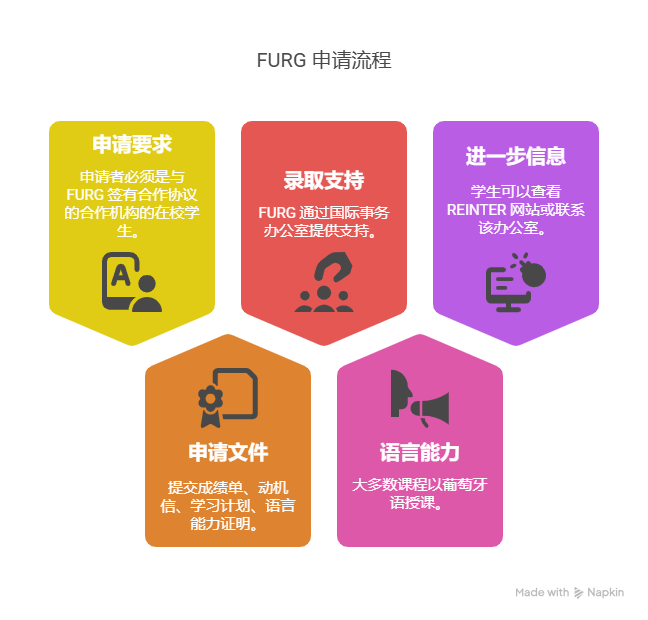
有興趣在里約格蘭德聯邦大學(FURG)就讀的國際學生,可透過各種計劃與協議來申請。FURG 提供本科與研究所層級的學習機會,途徑包括交換計劃、雙邊合作協議,以及如流動網絡與獎學金計劃等國際倡議。
申請者須為與 FURG 簽有合作協議的夥伴機構的在學學生。申請流程通常包括提交成績單、動機信、學習或研究計劃、語言能力證明(通常為葡萄牙語或英語)及該計劃所需的其他文件。
一旦獲錄取,FURG 會透過**國際事務辦公室(REINTER)**提供支援,包括抵達前手續、簽證指導、住宿資訊,以及協助學生融入大學生活。REINTER 也會提供迎新說明會及在學期間的持續協助。
FURG 的課程多數以葡萄牙語授課,因此建議具備該語言的能力。然而,在研究所階段,部分計劃也可能提供英語授課或研究機會。
學生可透過 REINTER 網站查閱開放的機會與公告,或直接聯繫該辦公室以獲得更多資訊。
-
11/06/202510h05Notícia
About FURG
The Federal University of Rio Grande (FURG) is a federal public institution of higher education, recognized in Brazil for its strong focus on coastal and oceanic ecosystems. Its journey began in 1955 with the creation of the School of Industrial Engineering, the first higher education initiative in the city of Rio Grande. This milestone marked the starting point for the consolidation, 14 years later, of the university.
Some of the key historical milestones include:
-
1955 – Creation of the Faculty of Political and Economic Sciences, expanding higher education in the region;
-
1956 – First inaugural class held;
-
1959 – Establishment of the Faculty of Law and the Catholic Faculty of Philosophy of Rio Grande;
-
1960 – Graduation of the first class of Industrial Engineering, composed of six graduates;
-
1969 – Official founding of FURG, integrating these institutions under a new federal university structure.
Since then, FURG has been growing steadily, expanding its reach with new courses, research and extension centers, and extending its presence through advanced campuses in Santo Antônio da Patrulha, São Lourenço do Sul, and Santa Vitória do Palmar.
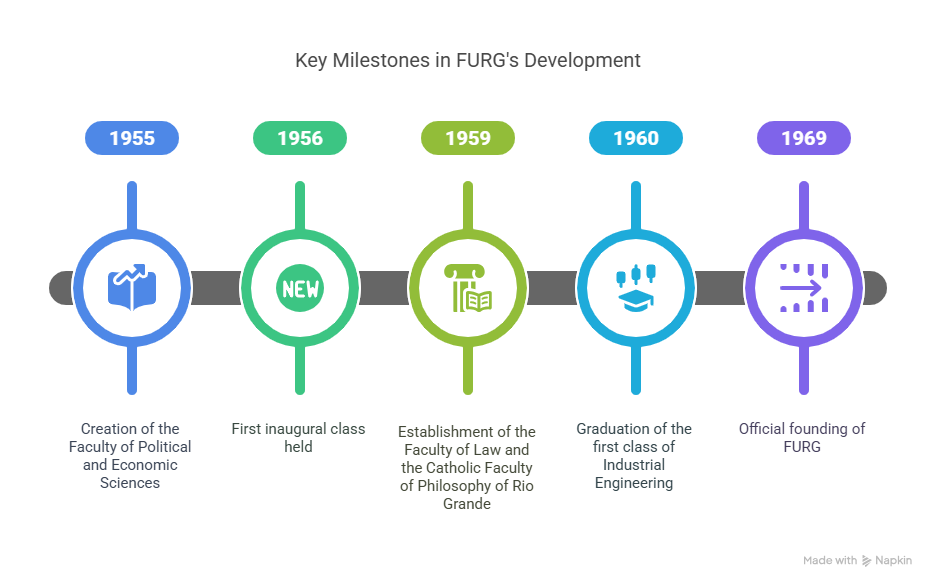
Our Mission
FURG's mission is to educate critical, creative, ethical citizens committed to social transformation through the integration of teaching, research, extension, and innovation. It promotes high-quality, free, and inclusive education based on sustainability, human rights, and social justice.
Our Focus
FURG is one of the few federal universities in Brazil with an institutional focus on coastal and oceanic ecosystems. This is reflected in its academic offerings, research, and extension projects. This strategic orientation is evident in programs such as Oceanology, Coastal Engineering, Marine Biology, and Environmental Management.
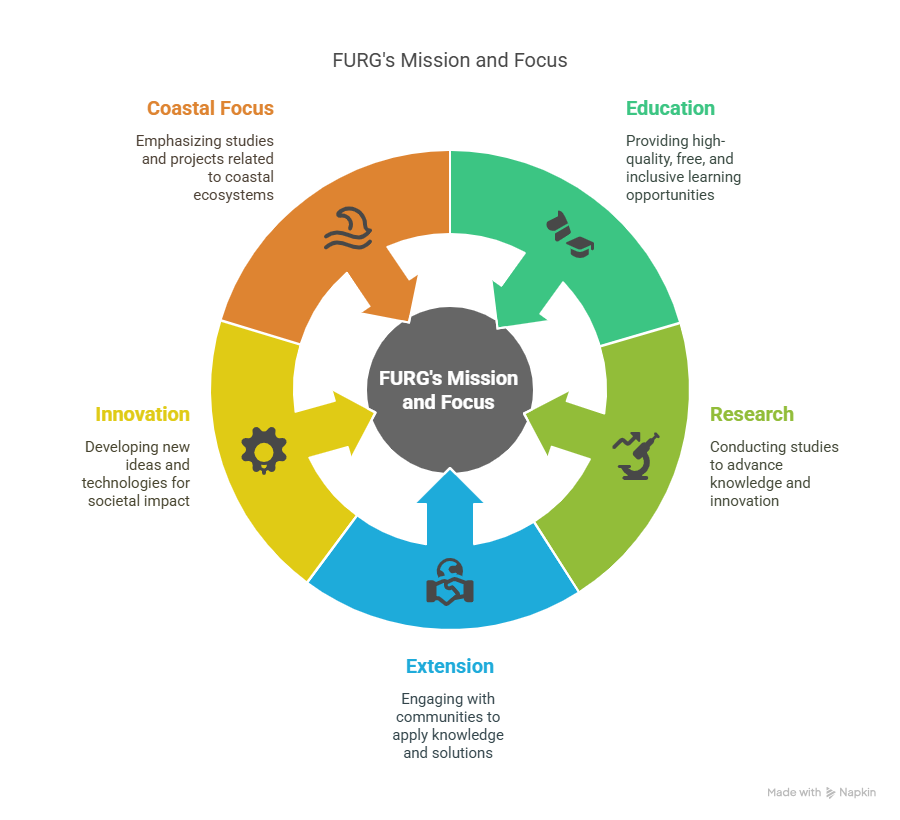
This focus also materializes through structures such as:
-
Oceanographic Museum "Prof. Eliézer de Carvalho Rios" – one of the largest marine science museums in Latin America;
-
Marine Animal Recovery Center (CRAM) – a national reference in coastal wildlife rehabilitation;
-
Interdisciplinary laboratories and research centers dedicated to the management and conservation of the southern Brazilian coast.
FURG in Numbers
Courses
-
70 on-campus undergraduate programs
-
12 residency programs
-
19 specialization (lato sensu) programs
-
35 master's degree programs
-
17 doctoral programs
-
160 research groups certified by CNPq
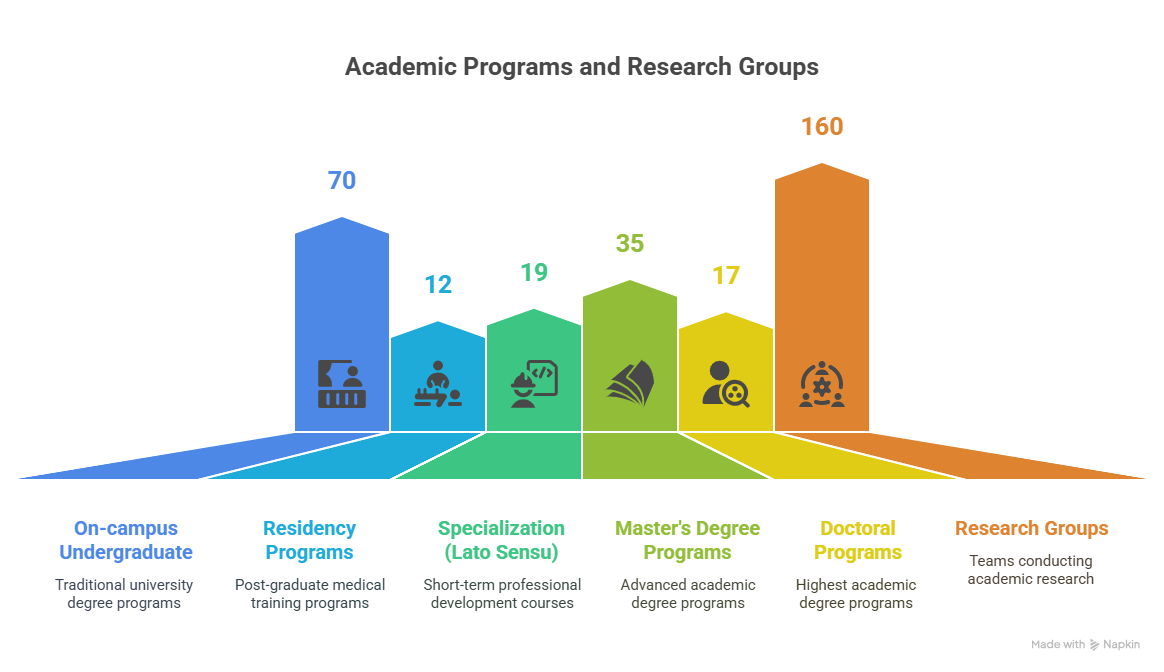
Academic Community-
Over 7,000 on-campus undergraduate students
-
Over 250 distance learning undergraduate students
-
Around 2,000 graduate students
-
Approximately 860 faculty members
-
Over 1,050 technical-administrative education staff
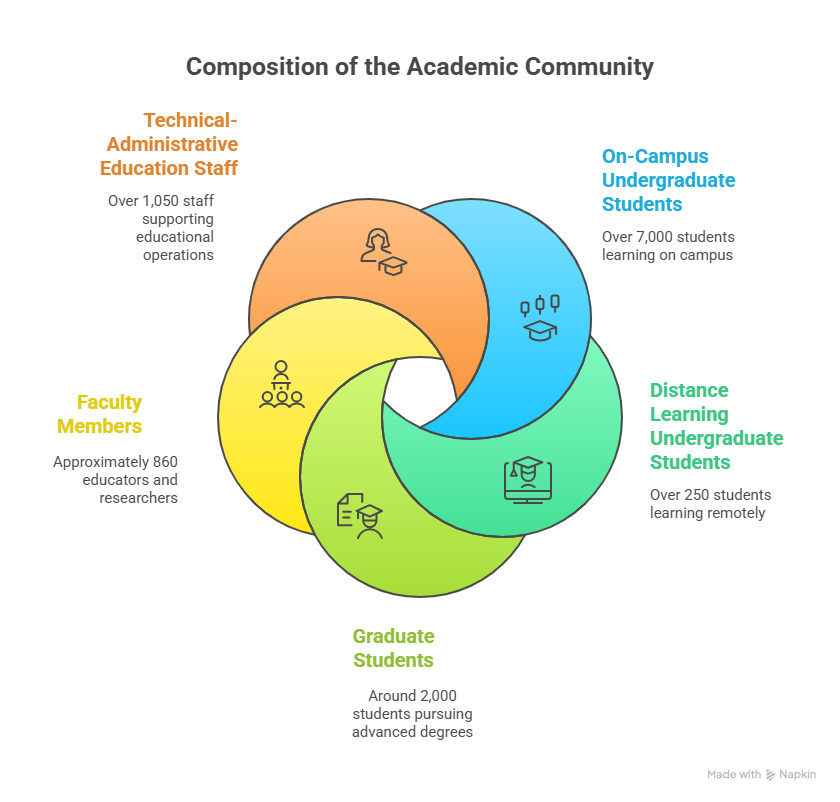
Commitment to Inclusion and Diversity
A pioneer in affirmative action, FURG was one of the first federal universities to implement specific seats for Indigenous and Quilombola students. It also maintains free graduation ceremonies, helping ensure access and retention for students in vulnerable situations.
Innovation and Regional Development
FURG plays a strong role in promoting innovation, supported by structures such as:
-
Oceantec – a technology park focused on the blue economy;
-
INNOVATIO – a center for innovation support and intellectual property;
-
Business and startup incubators.
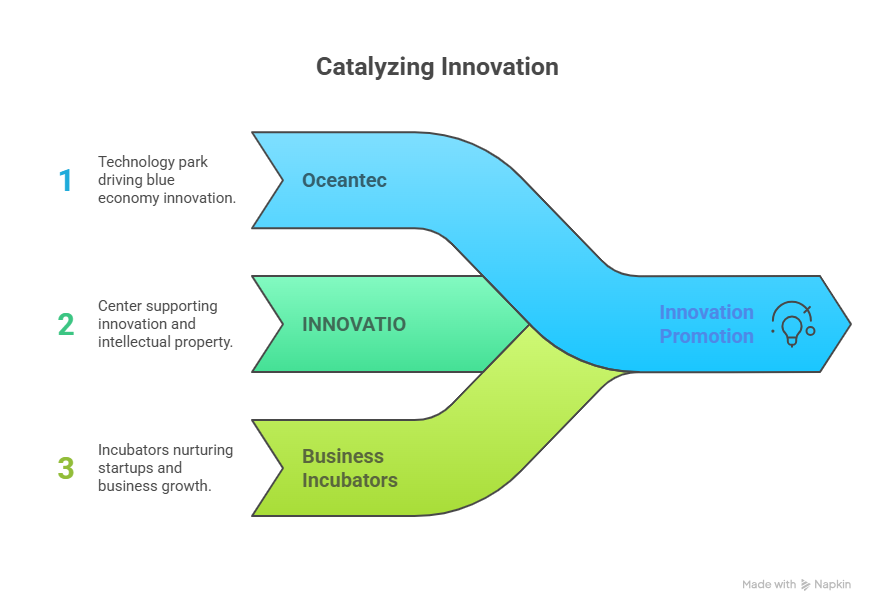
These initiatives strengthen the connection between the university, the productive sector, and society, fostering sustainable regional development.
FURG is more than an educational institution: it is an agent of social, environmental, and scientific transformation. Its commitment to coastal ecosystems and social justice positions it as a strategic hub for southern Brazil and for the communities that are part of it. Educating with quality, researching with relevance, and extending with responsibility are the pillars that support our work.
-
-
04/06/202515h09Notícia
How to obtain a double degree
The PROPESP/FURG Normative Instruction No. 1, dated May 8, 2023, establishes internal regulations for the process flow of cotutelle and double degree agreements in the graduate programs of the Federal University of Rio Grande (FURG).
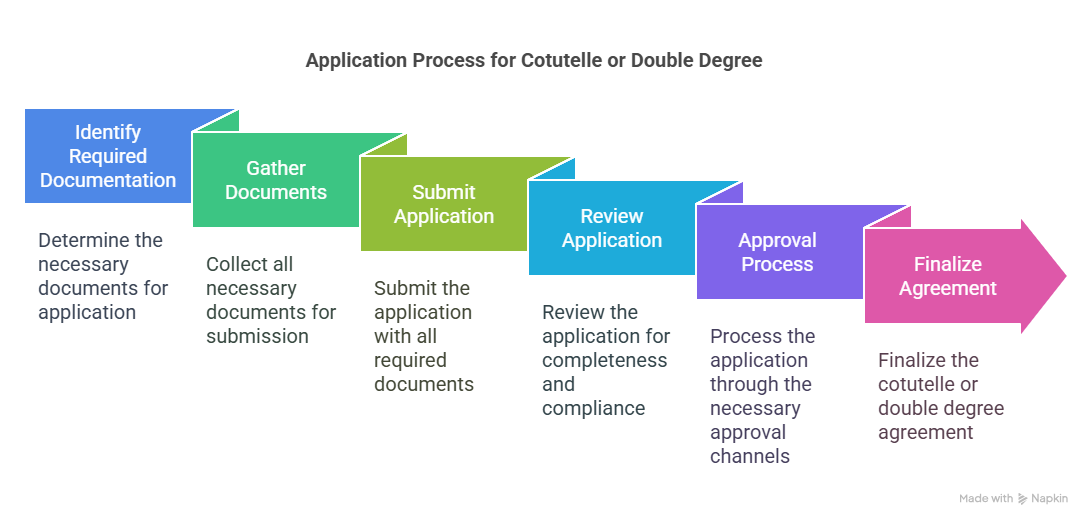
Required documentation for applying for cotutelle or double degree:
-
Copy of the cooperation agreement signed between FURG and the foreign partner institution;
Cotutelle or double degree agreement, according to the models provided by FURG or by the foreign institution, provided that the principles of FURG’s regulations are respected;
Updated academic transcript;
Proof of enrollment for the semester in which the application is made, issued by the program’s office or the academic records department;
Copy of the passport;
Academic study plan detailing the activities to be carried out;
Schedule of activities at each institution, ensuring a minimum stay of six months at the foreign institution;
Dissertation or thesis project;
Declaration of agreement from the supervisors at FURG and at the foreign institution;
Declaration of agreement from the graduate programs (or equivalents) of both institutions.
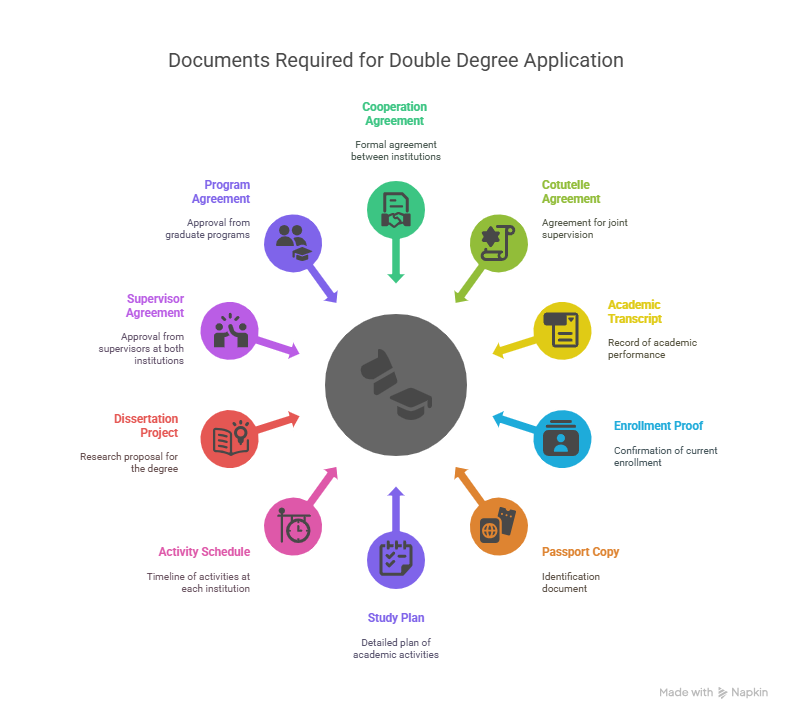
The cotutelle and/or double degree agreement must be written in Portuguese and in the language defined by the foreign university, and must include, at a minimum:
-
The set of activities to be carried out at each institution;
The formalization of the agreement by the supervisors and the programs involved;
The language(s) in which the dissertation or thesis will be written, in the case of a double degree;
The format, location of the defense or presentation, and other relevant details;
The financial obligations of the parties, in accordance with current legislation;
Other specific academic requirements to be fulfilled by the student.
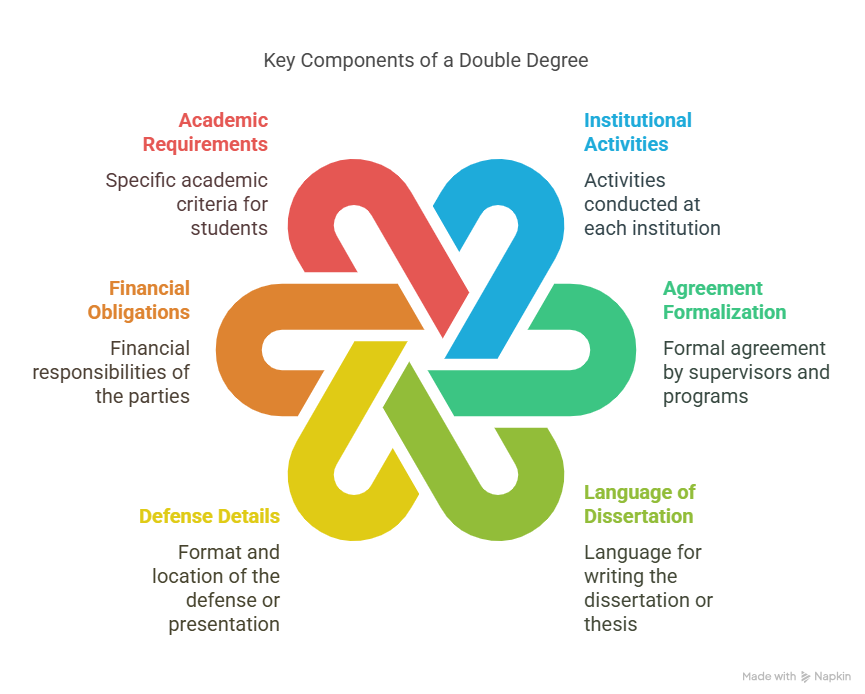
These regulations aim to ensure transparency, legal certainty, and academic rigor necessary for the development of graduate programs under cotutelle and double degree agreements, strengthening internationalization and the quality of education at FURG.
-
-
03/06/202513h43Notícia
-
01/11/201809h57Notícia
Contact
Head of International Affairs
Dariano Krummenauer
reinter.assessor@furg.brCoordinator of International Mobility
Nicole Marques Feijó
reinter.mobilidade@furg.brAgreements Sector
Diego de Lemos Ávila
reinter.convenios@furg.brAdministration Sector
Maurício Terra
internacional@furg.brMedia and Publicity Sector
Isadora Jaegger
reinter@furg.br -
03/10/201713h25Notícia
Who we are
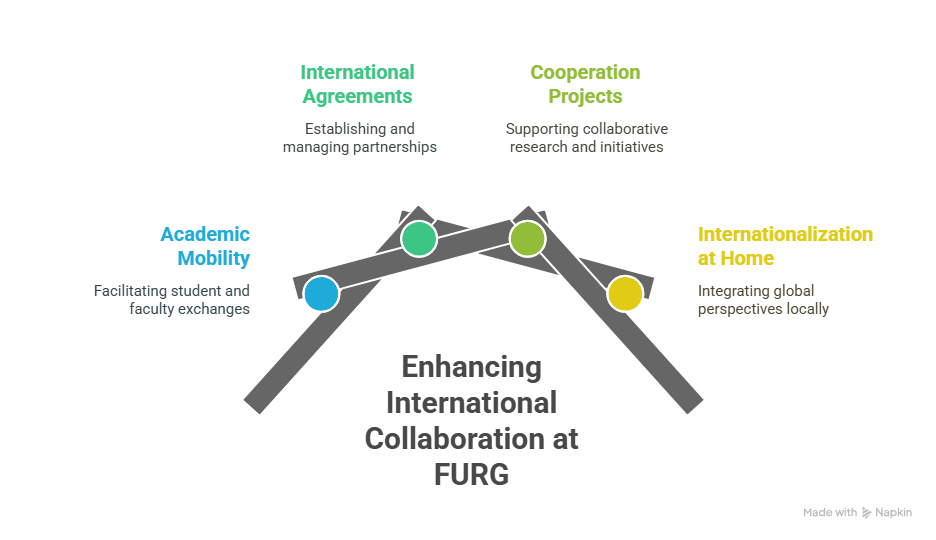
The Office for International Relations (REINTER) is an administrative body linked to the Rectory of the Federal University of Rio Grande (FURG), responsible for coordinating and promoting the university’s internationalization processes in the areas of teaching, research, and outreach.
REINTER works to strengthen academic and scientific cooperation between FURG and higher education institutions, research centers, and international organizations. This includes promoting academic mobility opportunities for students, faculty, and staff, as well as providing support and guidance for international visitors who join the university through exchange programs, bilateral agreements, or multilateral initiatives.
In addition to mobility, REINTER supports the signing and management of international agreements, cooperation projects, and “internationalization at home” initiatives, promoting actions and events that integrate the local academic community with international contexts.
Located on the ground floor of the Rectory building, the REINTER team is available to discuss collaborative actions between FURG and international institutions.
GALERIA

